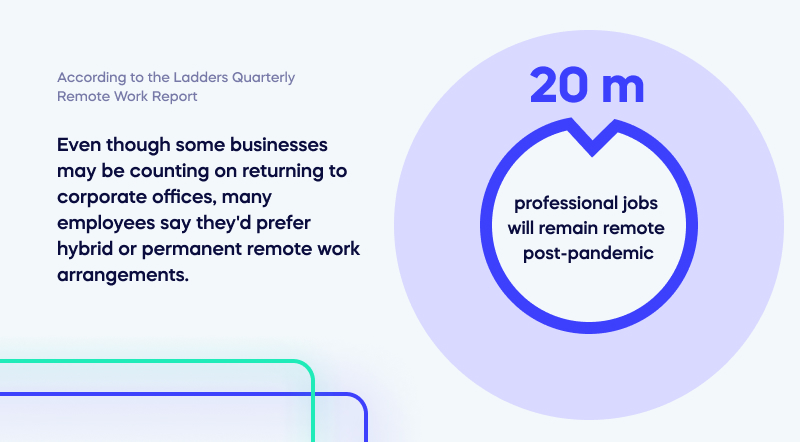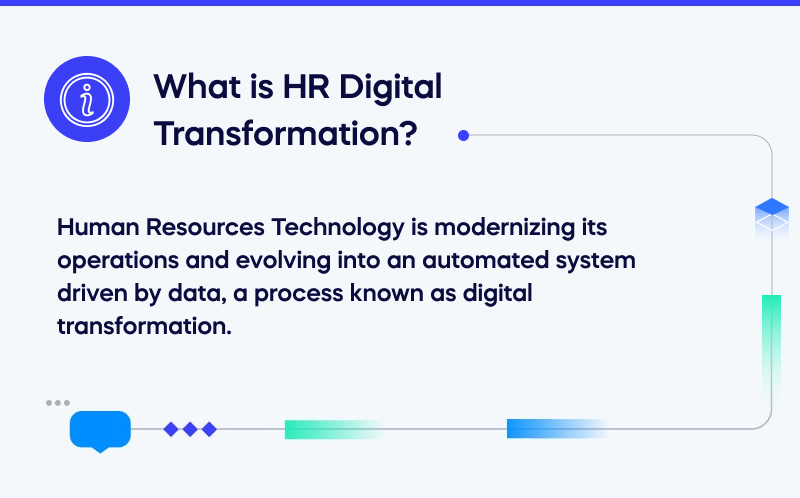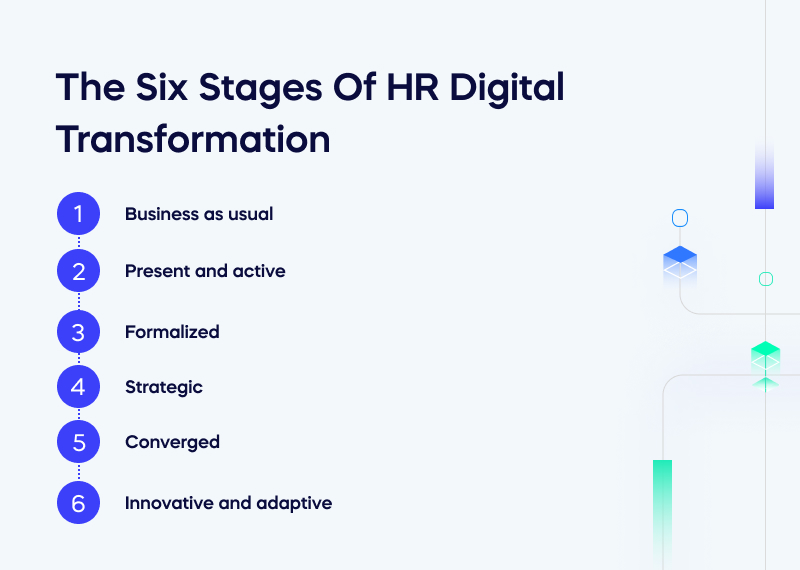HR digital transformation is a hot topic among HR professionals, as digitalization has the potential to revolutionize Human Resources in unprecedented ways.
However, contemplating this idea is different from implementing it. To help you start this challenging journey, we’ve created a guide to the six stages of HR digital transformation.
Even before the pandemic, work was evolving rapidly out of necessity. Now, as we explore remote and flexible work options, this evolution continues into new territories.
According to the Ladders Quarterly Remote Work Report, 20 million professional jobs will remain remote post-pandemic. While some businesses plan to return to offices, many employees prefer hybrid or permanent remote work arrangements.
This article explores the digital transformation of Human Resources, examining its necessity today and how to achieve the best outcomes.
What is HR digital transformation?
Human Resources Technology is modernizing operations and evolving into an automated, data-driven system, a process known as digital transformation.
Deloitte’s Human Capital Trends Survey highlights the dual burden HR teams face: pioneering work transformation and workforce evolution.
HR digital transformation isn’t just a departmental shift but an organizational one. The HR department must lead the transition, ensuring everyone understands their role in the process.
Why is HR digital transformation important?
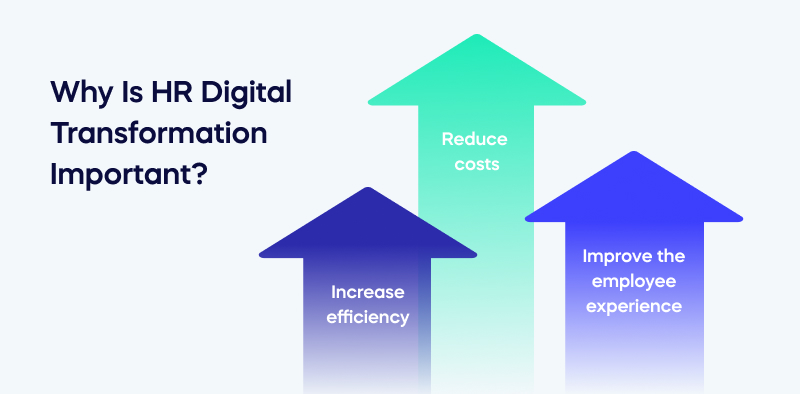
Regardless of the scope of an HR transformation, digital or otherwise, success requires a clear goal. Changes must be financially sensible to ensure long-term viability and growth.
HR digital transformation allows organizations to boost efficiency, cut costs, and enhance the employee experience. Through automation and analytics, HR can make quicker, better decisions, streamline operations, and become a more strategic business partner.
What you need for a successful HR digital transformation
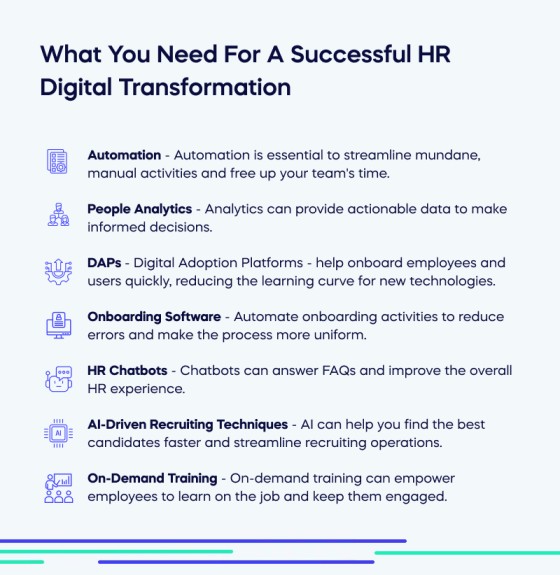
If you’re looking to upgrade your Human Resources digital strategy, consider these popular digital transformation solutions:
- Automation – Streamline mundane tasks to free up your team’s time.
- People analytics – Use analytics to gain actionable insights for informed decision-making.
- DAPs – Digital Adoption Platforms help onboard employees quickly, reducing the learning curve for new technologies.
- Onboarding software – Automate onboarding to reduce errors and standardize the process.
- HR chatbots – Chatbots can answer FAQs and enhance the HR experience.
- AI-driven recruiting techniques – AI can help find top candidates faster and streamline recruitment.
- On-demand training – Empower employees to learn on the job and stay engaged.
These solutions offer tangible benefits and can elevate your digital transformation journey.
The six stages of HR digital transformation
Stage 1: Business as usual
Traditional methods remain the standard for recording and communication.
Due to a lack of vision and reluctance to change, HR departments struggle to gain an edge in recruitment and retention.
Stage 2: Present and active
Leadership and HR acknowledge feedback, while individual HR employees experiment with digital transformation. HR professionals upskill employees to leverage new technologies effectively.
Managing teams is more complex in a virtual environment, so HR must prioritize culture, communication, trust, and career development.
Stage 3: Formalized
As transformation begins, candidate and employee data inform decisions. Efforts are made to address discrepancies as teams collaborate on new technology. Executives guide the process while team members contribute their expertise.
Stage 4: Strategic
HR teams conduct studies on employee satisfaction by sharing data and feedback across departments. Investments in new technologies support digital transformation, enabling a more efficient workforce.
Stage 5: Converged
By recruiting innovative HR executives and agencies, organizations can enhance hiring, onboarding, learning, and goal journeys with experiential “micro-moments” that boost satisfaction, performance, and retention.
Stage 6: Innovative and adaptive
Digital transformation extends beyond HR, defining the entire organization. From product development to marketing, digital technology enhances performance company-wide.
An innovation team tracks technological developments to uncover improvement opportunities.
After progressing through the six stages, organizational mindsets are transformed.
This digital mentality involves more than just using technology; it requires awareness that our world is ever-evolving, and businesses must adapt to survive.
How to get started with HR digital transformation
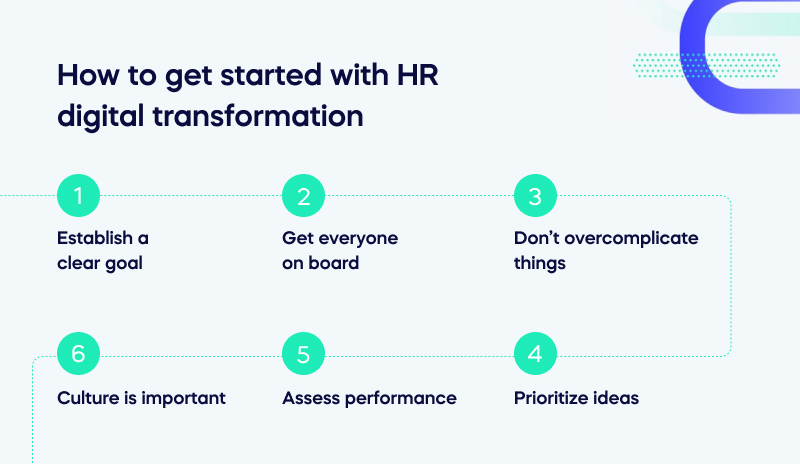
While promising, starting an HR digital transformation can be daunting.
To simplify the initial leap, here are some essentials for success:
Establish a clear goal
Before beginning your HR transformation journey, ensure you have a specific purpose that benefits the business. Generally, this objective should focus on solving an employee issue.
During the HR transformation process, keep employee needs in mind. Before implementing new technology, allow employees to test it to ensure their satisfaction and successful use.
Get everyone on board
A successful digital HR transformation requires enthusiastic participation from the entire organization, including employees and leaders.
Gaining support from all stakeholders is essential for a successful outcome.
Don’t overcomplicate things
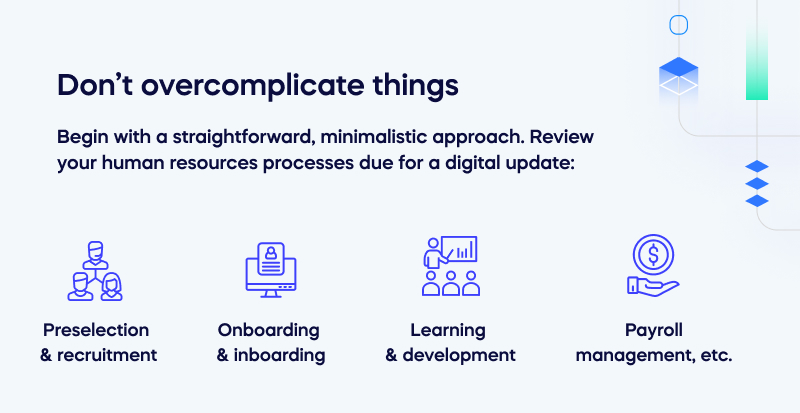
Start with a straightforward approach. Review HR processes due for a digital update, such as recruitment, onboarding, learning and development, and payroll management.
Discuss priorities with the C-suite and employees to determine which changes to focus on first.
Prioritize ideas
Prioritize ideas based on impact and effort. Distinguish the business consequences of digitizing ideas from the time and expenses required.
To kick-start your digital HR journey, begin with high-impact, low-effort ideas to quickly build the business case for digital HR.
Assess performance
Embracing digital technologies is commendable, but we must reflect on their impact to succeed. Measure what works and discard what doesn’t to progress.
Moving forward productively requires using technological solutions that effectively address real issues.
Culture is important
Digital technology is only part of the equation in HR and digital transformations. A strong corporate culture that promotes innovation and inclusion is equally important.
All members, from new recruits to top executives, need to adopt a digital mindset to ensure a successful transformation.
HR digital transformation: The key to unlocking organizational growth
The HR digital transformation journey is crucial for organizations seeking to unlock their potential and gain a competitive edge in the 21st century.
By taking the necessary steps and ensuring everyone is on board, businesses can see tangible improvements in employee morale, productivity, and overall growth.
Digital HR transformation allows organizations to better manage their people and keep up with the ever-evolving job market. With the right approach and attitude, companies can reap the rewards of a successful HR digital transformation.


